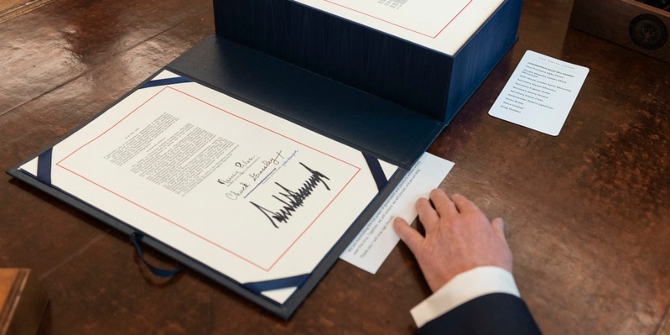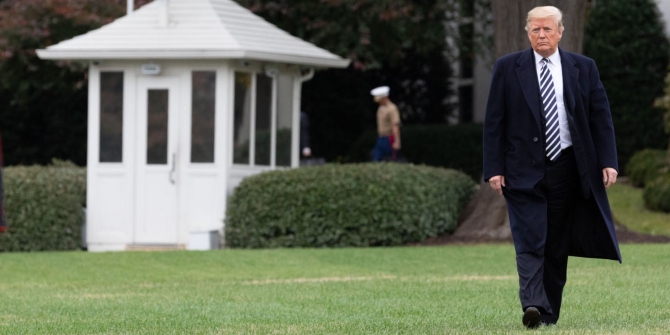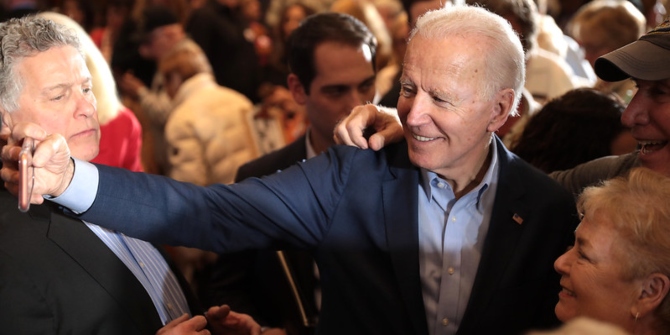 Last night saw the third and final presidential election debate between Donald Trump and Hillary Clinton. US Centre Director, Peter Trubowitz comments that while Clinton may have had a few weak moments, she came prepared and sounded presidential. By contrast, Trump’s refusal to say that he would accept the election results were he to lose will do nothing to reassure voters who have been reluctant to get behind him.
Last night saw the third and final presidential election debate between Donald Trump and Hillary Clinton. US Centre Director, Peter Trubowitz comments that while Clinton may have had a few weak moments, she came prepared and sounded presidential. By contrast, Trump’s refusal to say that he would accept the election results were he to lose will do nothing to reassure voters who have been reluctant to get behind him.
1) Who won last night?
Hillary Clinton did. While Donald Trump probably had his best debate performance on the issues, I think his refusal to say if he will accept the election results – commenting “I’ll keep you in suspense” to moderator Chris Wallace – was a major blunder. That will be the lede in every news story in the US today and it is hard to see how it helps him convince those voters still on the fence to get behind him. Those voters have had misgivings about Trump’s temperament and maturity throughout the campaign and I don’t think they will be reassured by his refusal to say he will concede if he loses. Meanwhile, those voters who favour Clinton saw little reason last night to change their minds. She had a few weak moments, but she came prepared and looked and sounded presidential. She’s helped herself in all three debates. Donald Trump: not so much.
2) Do you think last night’s debate will have much impact on the campaign?
Probably not. Clinton is leading in all the national polls and she has the edge in most of the battleground states — states that are normally up for grabs in a presidential year. It’s hard to see how Trump’s performance last night changes that political dynamic in any fundamental way. If anything, I would expect Clinton to expand on her lead after last night’s performance. As we head into the final stage of the campaign, the election is hers to lose.
3) What should we be looking for from Clinton and Trump in the remaining 20 days of the campaign?
Clinton faces a choice: does she focus her efforts on the Democratic base to make sure they turn out on November 8 or reach out to disenchanted Republicans in hopes of generating a landslide akin to Lyndon Johnson’s 1964 victory against Barry Goldwater. She needs to guard against complacency and insure that voters will look back on the election result as a policy mandate — a vote for a clear policy direction. Reaching out to Republicans muddies the message: it becomes more about what she isn’t (i.e. Trump) than what she stands for and will do as president. In Trump’s case it’s anybody’s guess. His path to victory in the Electoral College is now very narrow and I think the question he needs to answer, if he hasn’t already, is what matters more: winning the presidency or building his brand? My sense is that he’s more focused on the latter.
Featured image credit: DonkeyHotey (Flickr, CC-BY-SA-2.0)
Please read our comments policy before commenting.
Note: This article gives the views of the author, and not the position of USAPP – American Politics and Policy, nor the London School of Economics.
Shortened URL for this post: http://bit.ly/2ejttV1
_________________________________
 Peter Trubowitz – LSE US Centre
Peter Trubowitz – LSE US Centre
Peter Trubowitz is Professor and Head of International Relations, and Director of the LSE’s US Centre. His main research interests are in the fields of international security and comparative foreign policy, with special focus on American grand strategy and foreign policy. He also writes and comments frequently on U.S. party politics and elections and how they shape and are shaped by America’s changing place in the world.







As a reminder, the 2000 Al Gore campaign contested the election results for that year (with the full support of the Clintons, the media, and other Leftists groups). Today, these same people act horrified that Trump would do the same.
On a separate note, people in the U.S. have a right to vote. But the people also have a right to have a fair election system that is free of fraud. That being said, (for example) people in the U.S. can vote without providing identification of who they are. That leaves the door open for people to commit fraud by alleging to be somebody else and voting on their behalf (such as deceased people somehow “voting” because the Board of Elections did not take that person off the voter registry for that District because they are unaware of the death). The fact that the Democratic Party is so antagonistic to attempts to require voter ID leads to the appearance of acceptance of election fraud (somehow, they tie this to “racism”); and because they are the main beneficiaries of such fraud . (As a reminder, the lack of papers was used as a mechanism for economic migrants to trespass across Europe and allege to be “Syrian”, so they could fraudulently remain in Europe). Hence, the lack of papers is a tool for the commission of fraud, for which the Democratic Party is complicit in such acts.
Based on the above, why would Trump merely accept the results of an election that will have plenty of fraud.